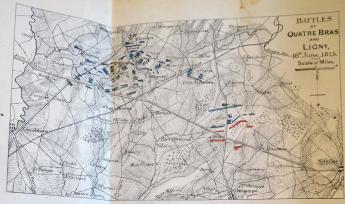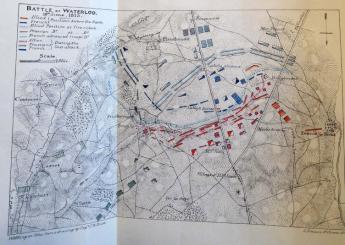Antiquarian Booksellers' Association Adrian Harrington Rare Books
Collecting History - Two Hundred Years On, Napoleon Is Still Much More Interesting than Arthur Wellesley

By James Murray
Second Charlemagne, or Bogeyman? Super Man or Tyrant? Whether you’re a fan or a critic, it’s hard to overstate the significance of the 30 year career of Napoleon Bonaparte, who fought and lost his final battle at Waterloo 200 years ago today. Appointed Brigadier General at the age of 24 for his inspired use of artillery at the siege of Toulon in 1793, it soon became obvious that Napoleon was Republican France’s most gifted young commander. Over the following 20 years he helped expand the borders of France to include parts of Spain, the Netherlands and Italy, and subdued all the great powers of mainland Europe in a series of enormous battles the scale of which had not been seen since Antiquity. Over the whole period it has been estimated that up to 5,000,000 combatants were killed, having a greater relative impact on the population of France than the First World War.
Despite astonishing and terrifying the world with his lightning manoeuvres and remorseless expenditure of human lives, Napoleon and Republican France were ultimately crushed. Exhausted by constant total warfare rather than strategically defeated on the battlefield, Napoleon left France economically ravished and decisively toppled from its position as the most powerful European nation. Thus this final battle, Waterloo, is rightly regarded as one of the most pivotal moments in Modern British history, ushering in a century of rapid economic and colonial expansion, and global naval domination. It is perhaps no coincidence then that our recent post-colonial age has seen these wars and their principle players romanticised by novelists such as Bernard Cornwell, Patrick O’Brian, C. S. Forester, and Douglas Reeman. These patriotic pseudo-historical accounts, often based on extensive research, present the British armed forces at their best – fighting as heroic under-dogs for the last time while saving the rest of Europe from French Republican autocracy. Cornwell’s creation, the Richard Sharpe series, is perhaps the most interesting of these, since the eponymous protagonist manages to be present not only at most of the important battles of the Peninsula War in Portugal and Spain, but also at the Siege of Copenhagen, the naval battle of Trafalgar, and of course the coup de grace, Waterloo.
And yet, for all this British smugness (one might even whisper “propaganda”) it is Napoleon, not Wellington, who remains the enduring, compelling, endlessly fascinating character. While Wellington appears in the Sharpe series as the straight man – the ‘M’ to Sharpe’s 007 – Napoleon is the unseen evil, or Blofeld, to complete the analogy. The secret to his success is of course the ambiguity of his character. It is impossible to make a definitive judgement. In the nineteenth century this simmering question gave rise to a whole sweep of challenging literature, including Alexandre Dumas’ ‘Count of Monte Cristo’, Tolstoy’s ‘War and Peace’, and Dostoevsky’s ‘Crime and Punishment’. Dostoevsky’s contribution is particularly interesting because he pares the question right back to its bare essentials: what is ‘greatness'; at what cost is it achieved; and what good is it? The brilliant but poor Raskolnikov carefully plans the murder of an old and widely disliked old woman with a great deal of money he believes he could make better use of. But when the repellent act itself causes hesitation and confusion and he is forced to clumsily murder her sister, who becomes an unexpected witness, the central character spirals into a pit of self doubt and madness. Raskolnikov wished to emulate Napoleon by rising above the normal confines of morality – rising to become like a god, with the power and the right to commit murder, even of millions if necessary, for higher ideals. In the event he discovered such a thing was impossible; his natural good nature was fundamentally incompatible with such viciousness.
Those of us thankfully not burdened with such delusions of grandeur, however, would do well to think twice before writing Napoleon off as a Nietzschean super man, or Hitler-prequel. It was his devotion to Republican France, rather than a personal quest for power, which drove him to use what Thomas Carlyle later described as a ‘whiff of grapeshot’ against royalist forces during the battle of 13 Vendémiaire in 1795. We would do better by Napoleon in comparing him to Alexander the Great – a brilliant general who proved to the whole world that nothing is impossible. Although their two careers seem fundamentally different in the sense that Alexander never suffered a defeat, it is important to remember just how young he died. In the end, both these brilliant men learned the same lessons in the same ways. Astonishing success was followed by a sudden incomprehensible end to it all. The extract which follows is from the poem ‘Hercules Epitrapeszios Novi Vindicis’ by the Roman poet Statius. It is about a tiny but near-perfect statue of Hercules. I consider it a masterful unravelling and depiction of the immateriality of the things which drive some people, like Napoleon or Alexander, to be brilliant. This is precisely what Dumas’ ‘Count of Monte Cristo’ is all about as well, and they demonstrate that it is the moments after the unravelling of these mysteries which decide our moral qualities. The translation is my own.
‘…There is a worthy story to go with the sacred work. The Pellian king [Alexander]
Used to have this venerable deity on his happy tables,
Carrying him as a friend East and West,
And he would grasp him with the hand which a moment before had
Taken and bestowed crowns, and raised great cities to the ground.
He always used to seek courage for the next day’s battle from it;
Victorious, he would recount to it the successful actions;
Whether he had taken Indians away from Bromius in chains;
Or broken open closed Babylon with his great spear;
Or overwhelmed the lands of Pelops and Pelasgian freedom [Greece] with
War. And from that great rank of celebrated actions he
Was forced to make excuse for so great a triumph over the Thebans [Hercules’ home city].
Even when the Fates were cutting short his great deeds
As he was taking a draught from the fatal unmixed wine, grave under
The dark cloud of death, he was unsettled by the strange expression
Of his deity sitting on his last table, and the bronze which
Seemed as though it was about to sweat from real flesh.’
(lines 59 – 74).
***
Posted on the new blog Adrian Harrington Books. A Literary Scellany, presented here by permission of the author and Adrian Harrington. Pictures: Adrian Harrington Books


